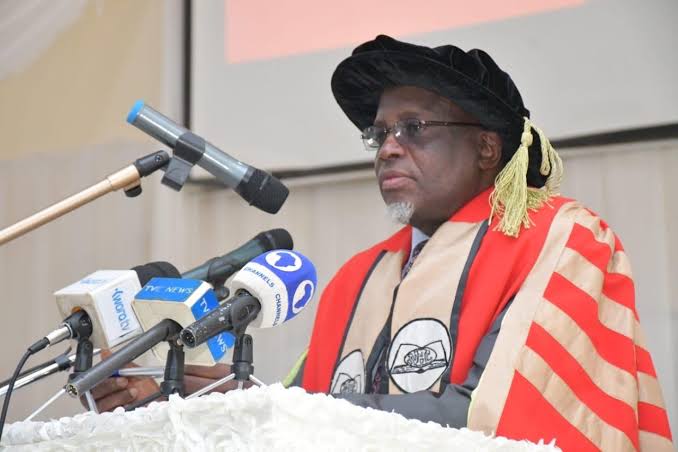*Oloyede’s Tenure As Proof That Systems Respond To Strong Leadership*
By Abdul Lauya
In a nation too often beset by leadership deficits and public sector inefficiencies, Professor Is’haq Olanrewaju Oloyede has emerged as a striking exception. For nearly nine years, he has led the Joint Admissions and Matriculation Board (JAMB) with a combination of accountability, innovation, and humility. As he approaches the end of his tenure, it is not the sound of scandals but the resonance of reforms, integrity, and uncommon patriotism that defines his legacy.
Born in 1954, Professor Oloyede holds a first class honours degree in Arabic from the University of Ilorin, where he also earned his PhD in Islamic Studies. Rising through the academic ranks, he became a professor in 1995 and served as the Vice-Chancellor of the University of Ilorin between 2007 and 2012. His tenure at Unilorin is still remembered for its stability, academic excellence, and adherence to ethical governance, a forerunner of what he would later bring to JAMB.
Beyond his academic duties, he was Secretary General of the Nigerian Supreme Council for Islamic Affairs (NSCIA), member of the Presidential Technical Committee on Education, and a board member in several national and international education-related institutions.
When Professor Oloyede was appointed as JAMB Registrar in 2016, few could have predicted the seismic shift he would bring. Under his leadership, JAMB transformed from a near-dormant agency riddled with inefficiencies to a symbol of what public service can look like when driven by purpose and transparency.
Prior to Oloyede’s tenure, JAMB was notorious for operational inconsistencies and opaque finances. It was unthinkable that a public examination body could remit substantial funds to the national treasury. However, within one year of assuming office, Oloyede shocked the nation, JAMB remitted a staggering N7.8 billion to the federal coffers, compared to the paltry N50 million average annually remitted by previous Registrars (all professors too). Since then, total remittances under his stewardship have crossed N50 billion, a record unbroken in Nigeria’s public service space.
Oloyede’s reforms have not been about money alone. He digitised the examination process, introduced the Central Admissions Processing System (CAPS), and clamped down on registration and exam malpractice syndicates. These reforms have not only improved the integrity of exams but also saved students and their families billions in hidden charges and logistical hassles.
He has also consistently acknowledged and apologized for the board’s rare operational hiccups, most recently when technical issues affected some UTME candidates. Rather than shift blame or offer excuses, he took full responsibility, ordered thorough investigations, and promised compensatory measures. In a country where leaders often dodge accountability, this was leadership of the highest order.
It is important to draw a clear line between the past and present of JAMB. Under former leaderships, accountability was scant, records opaque, and remittances negligible. The average Nigerian student viewed JAMB as a necessary evil. Under Oloyede, JAMB is now seen as a model of what responsible governance looks like.
Where his predecessors accepted inefficiency as the norm, Oloyede challenged entrenched interests, sanitised the system, and raised the bar. That some now criticise him, calling for his sack or even the scrapping of JAMB—is a reflection not of failure but of the deep discomfort his reforms have caused among corrupt networks now cut off from illicit gains.
It is telling that the loudest criticisms against Oloyede come not from students or parents, but from certain vested interests and rent-seekers whose financial pipelines have been shut. To these critics, reform equals ruin. But to millions of Nigerians, Oloyede is a breath of fresh air—a model of how public institutions should be run.
Rather than scapegoat him for systemic lapses, Nigeria should institutionalize his reforms and elevate him to higher national responsibilities. In saner climes, such records of performance and character would be rewarded, not punished.
Professor Is’haq Oloyede is more than an educational administrator. He is a moral compass in a system often lacking one. His example offers hope that Nigeria’s institutions can work when driven by people of integrity.
If leadership is about service, transparency, and responsibility, then Professor Oloyede deserves not just accolades but an even greater platform. Nigeria must not lose such a man to petty politics. The future of our institutions, and our country, depends on preserving and promoting leaders like him.
For advert placement and inquiries, publication of press releases, and news coverages, please call: Phone: 08052898434 Email: editor@eyereporters.com, click here to view the advert rates.



